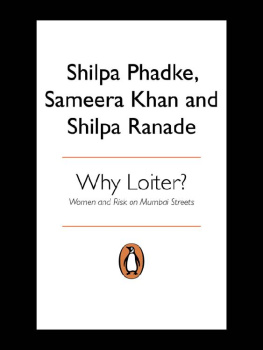Shilpa Phadke - Why Loiter?
Here you can read online Shilpa Phadke - Why Loiter? full text of the book (entire story) in english for free. Download pdf and epub, get meaning, cover and reviews about this ebook. year: 2011, publisher: Penguin Books Ltd, genre: Romance novel. Description of the work, (preface) as well as reviews are available. Best literature library LitArk.com created for fans of good reading and offers a wide selection of genres:
Romance novel
Science fiction
Adventure
Detective
Science
History
Home and family
Prose
Art
Politics
Computer
Non-fiction
Religion
Business
Children
Humor
Choose a favorite category and find really read worthwhile books. Enjoy immersion in the world of imagination, feel the emotions of the characters or learn something new for yourself, make an fascinating discovery.
- Book:Why Loiter?
- Author:
- Publisher:Penguin Books Ltd
- Genre:
- Year:2011
- Rating:4 / 5
- Favourites:Add to favourites
- Your mark:
- 80
- 1
- 2
- 3
- 4
- 5
Why Loiter?: summary, description and annotation
We offer to read an annotation, description, summary or preface (depends on what the author of the book "Why Loiter?" wrote himself). If you haven't found the necessary information about the book — write in the comments, we will try to find it.
Why Loiter? — read online for free the complete book (whole text) full work
Below is the text of the book, divided by pages. System saving the place of the last page read, allows you to conveniently read the book "Why Loiter?" online for free, without having to search again every time where you left off. Put a bookmark, and you can go to the page where you finished reading at any time.
Font size:
Interval:
Bookmark:

Women and Risk on Mumbai Streets

PENGUIN BOOKS
Shilpa Phadke is a sociologist. She is Assistant Professor at the Centre for Media and Cultural Studies at the Tata Institute of Social Sciences, Mumbai. She has been educated at St. Xaviers College, Mumbai, SNDT University, Mumbai and the University of Cambridge, UK. She conceived and led the Gender and Space project at PUKAR. Her areas of concern include pedagogy; middle-class sexuality and the new spaces of consumption; feminist politics among young women; and urban transformations. She has published widely in newspapers and magazines and in academic journals and books. She loves the chaotic city of Mumbai and fantasizes that it will one day have a very large park.
Sameera Khan is a Mumbai-based journalist, writer, and researcher. A former assistant editor at the Times of India, she currently teaches journalism at the Tata Institute of Social Sciences and is a research associate with PUKAR, an urban research collective, where she worked on the Gender and Space project. An active founder member of the Network of Women in Media, India, she has contributed essays to several anthologies including Bombay, Meri Jaan: Writings on Mumbai and Missing: Half the Story, Journalism as if Gender Matters. She has a BA in history and Anthropology from St. Xaviers College, University of Bombay, a diploma in mass communications from Sophia Polytechnic, and an MS in journalism from Columbia University, New York.
Shilpa Ranade is a practising architect and researcher. She trained in architecture from CEPT, Ahmedabad and has an MA in Comparative Cultural and Literary Studies, University of Arizona, Tucson: her thesis examined the trope of motherhood in late twentieth century Hindu nationalism. She has been associate editor of the South Asian volume in the series World Architecture 19002000: A Critical Mosaic and has also published articles in various architectural magazines. Shilpa is a founding partner of the design collaborative DCOOP where her portfolio includes interior, architecture, landscape and urban design projects.
This short, elegantly written book questions the myth that Mumbai is a paradise for women in public. The authors show that women of different class and cultural backgrounds in Mumbai operate under serious social, political and infrastructural constraints, and that the right to loiter is no more and no less than the right to everyday life in the global city. This book will appeal to social scientists, urbanists, gender scholars and, more generally, to all those who want to take fun more seriously.
Arjun Appadurai, Goddard Professor of Media, Culture and Communication, New York University
To ask the question Why loiter? is to place the issue of gender and space within the right perspective. Because it goes beyond safety and protection; it asserts womens right to public space, to do as they wish, instead of using it as a necessity for transiting from one point to another. This is the best part of this eminently readable, accessible and informative bookit meshes theory with experience, it is written in a lively style (not always evident in academic writing) and it recounts real-life experiences that will resonate with every woman, regardless of her age.
Kalpana Sharma, independent journalist, columnist, and author of Rediscovering Dharavi: Stories from Asias Largest Slum
Imagine an Indian city with street corners full of women: chatting, laughing, breast-feeding, exchanging corporate notes or planning protest meetings. Imagine footpaths spilling over with old and young women watching the world go by as they sip tea, and discuss love, cricket and the latest blockbuster. Imagine women in saris, jeans, salwars and skirts sitting at the nukkad reflecting on world politics and dissecting the rising sensex. If you can imagine this, youre imagining a radically different city.
Its different because women dont loiter. Men hanging out are a familiar sight in the city. A man may stop for a cigarette at a paanwalla or lounge on a park bench. He may stop to stare at the sea or drink cutting chai at a tea stall. He might even wander the streets late into the night. Women may not. We argue that theres an unspoken assumption that a loitering woman is up to no good. She is either mad or bad or dangerous to society.
Of course, no one actually says this out loud. But every little girl is brought up to know that she must walk a straight line between home and school, home and office, home and her friend or relatives home, from one sheltered space to another.
This book maintains that all of us, whether were women or men, regardless of our differences, have the right to loiter. When society wants to keep a woman safe, it never chooses to make public spaces safe for her. Instead, it seeks to lock her up at home or at school or college or in the home of a friend.
In this book, we explicitly foreground the middle-class woman because although public discussions of safety might appear to be about all women, they tend to focus implicitly only on middle-class women. In the urban Indian context, this middle-class woman is further assumed to be a young, able-bodied, Hindu, upper-caste, heterosexual, married or marriageable woman. A man with her set of identities would have open, legitimate and unquestioned access to public space. The middle-class woman is then apparently privileged in every way other than gender. Focusing on this woman then allows us to unravel the implicit assumptions of gender, class, caste, community and sexuality that underlie popular notions of safety.
Though the work is based in Mumbai, we hope the ideas and debates in this book will find resonance with the experiences of women in other cities in India and the world, especially those that are re-envisioning themselves as global cities. We also engage with the common myth that feminism is pass in the twenty-first century, and show just why and how relevant feminist politics is to re-imagining a vibrant and inclusive concept of citizenship in contemporary India.
We draw on the findings of a three-year-long research project, the Gender and Space project that focused on women and public space in Mumbai to demonstrate beyond reasonable doubt that despite the apparent visibility of women, even in urban India, women do not share equal access to public space with men. Women in Mumbai have, at best, conditional access to public space. Turning the safety argument on its head, we now propose that what women need in order to maximize their access to public space as citizens is not greater surveillance or protectionism (however well meaning), but the right to take risks. For we believe that it is only by claiming the right to risk, that women can truly claim citizenship. To do this we need to redefine our understanding of violence in relation to public spaceto see not sexual assault, but the denial of access to public space as the worst possible outcome for women. Instead of safety, what women would then seek is the right to take risks, for it is only by claiming the right to risk that we can truly claim citizenship.
The early ideas for this project were born in 1997, while one of us, Shilpa Phadke, was travelling through Agra, Gwalior, Jhansi, Orccha and Datia in North India with a friend. We reproduce some edited notes from her travel diary:
Font size:
Interval:
Bookmark:
Similar books «Why Loiter?»
Look at similar books to Why Loiter?. We have selected literature similar in name and meaning in the hope of providing readers with more options to find new, interesting, not yet read works.
Discussion, reviews of the book Why Loiter? and just readers' own opinions. Leave your comments, write what you think about the work, its meaning or the main characters. Specify what exactly you liked and what you didn't like, and why you think so.








